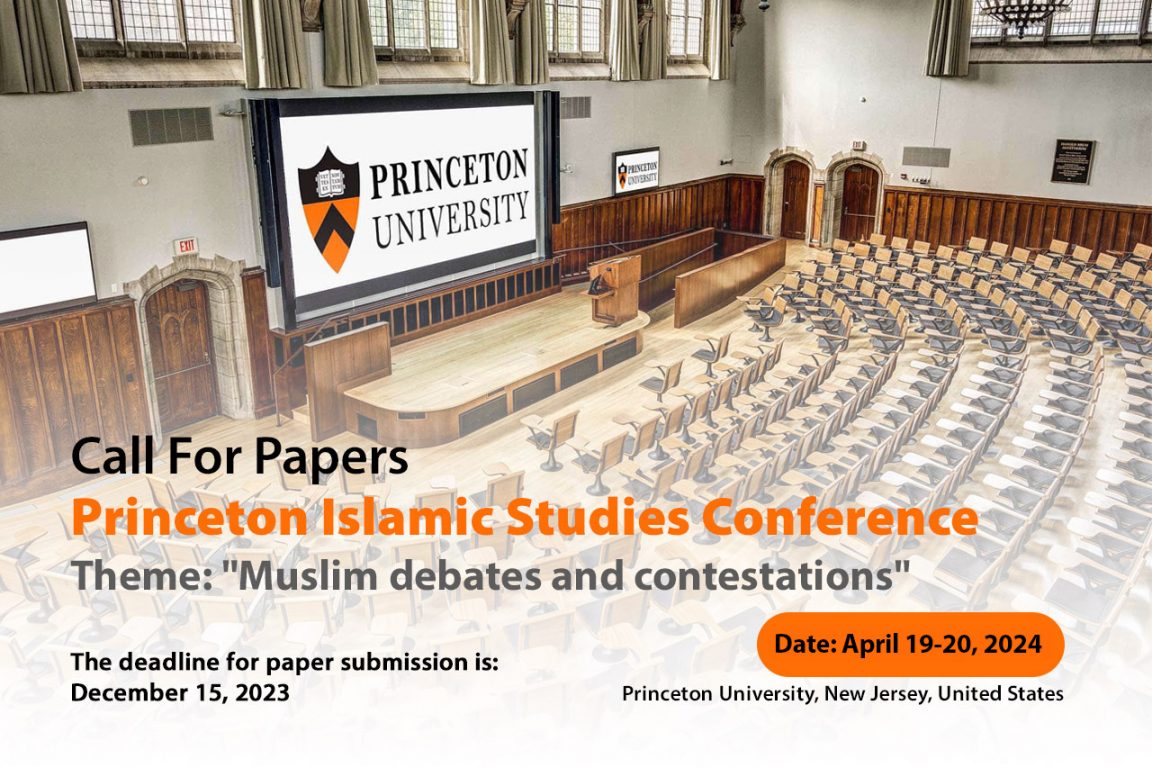Princeton Islamic Studies Conference: “Muslim Debates and Contestations”

About The Event
Call for Papers
Theme: “Muslim Debates and Contestations”
Date: April 19-20, 2024
Venue: Princeton University, Princeton, NJ 08544, USA
Abstract Submission Deadline: December 15, 2023
Keynote Speaker: Noah Saloman, University of Virginia
Graduate students and early-career scholars are invited to submit abstracts that examine the theme of “Muslim Debates and Contestations” for Princeton Islamic Studies conference. The conference will be held in person on April 5th and 6th 2024 at Princeton University; travel and lodging expenses will be covered for participants within North America.
Proposals covering different time periods and employing a variety of disciplinary and methodological perspectives including but not limited to Religious Studies, Anthropology, History, Literature, and Women and Gender Studies are welcome. There are multiple modalities of conceptualizing the role, format, and nature of debate and its associated implications for religion and society. Therefore, proposals approaching the category of debate in an expansive way and across its social, historical, religious, political, and other registers are encouraged to apply. Particular interest is placed on proposals that engage with the category of debate to conceptually contribute to methods and approaches to the Study of Islam and Muslim Societies.
Proposals may engage the following questions or other questions relevant to the conference theme:
- How do competing notions of politics inform competing visions of Islam? What does the category of the political mean to different Muslim actors?
- How have the categories of tradition and modernity been discussed and debated within Muslim intellectual thought, in varied contexts, regions, and disciplines of knowledge?
- How have the categories of orthodoxy, heterodoxy, and heresy been deployed by Muslims in their own contexts? What are some of the challenges of working with such categories in the academic study of Islam?
- How do notions of Islamic universalism inform more localized contestations of identity formation such as nationalism and/or sectarianism?
- How does scripture and exegesis become a site of contestation for key social and political issues in Islamic thought?
- What is the relationship between technology and Muslim traditions of debate? How do different technologies populating media and popular culture produce competing Islamic sensibilities in text and practice?
- What is the importance of and how should we study format, genres and material conditions in which Muslim debates and contestations occur?
- How do competing notions of history and “Islamic pasts” inform Muslim traditions of debate?
- How has gender served as a fundamental site of debate that speaks to larger questions of Muslim contestations?
- How do distinct modalities of debate and contestation interact with corresponding theological and metaphysical categories within the Muslim tradition like ikhtilaf, maslaha, etc.
- Can we posit and demarcate a category like a Muslim ethic of debate and disagreement? If so, what would it look like? How has it changed with time, if at al?
Please submit a 350-500 word abstract and title no later than December 15, 2023 to rel-isgc@princeton.edu. Due to budgetary constraints, unfortunately the conference is unable to cover travel expenses for applicants outside of North America.
More information on: Princeton University
Location
Princeton University


We're always eager to hear from you.
If you’d like to learn more about us or have a general comments and suggestions about the site, email us at